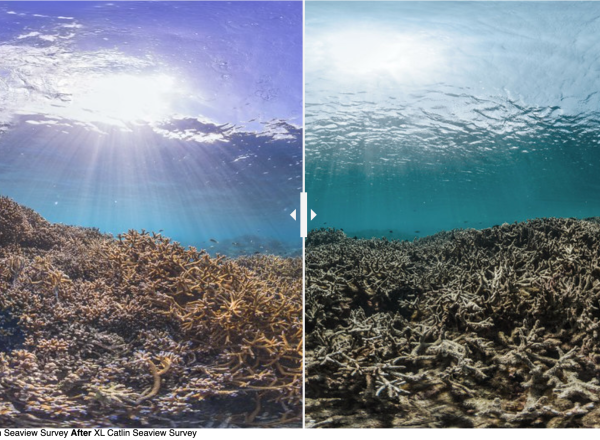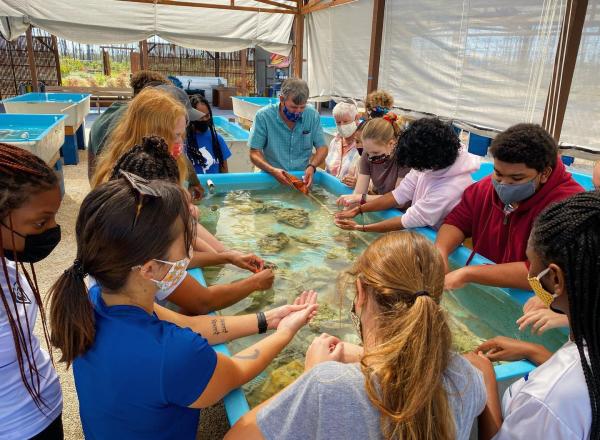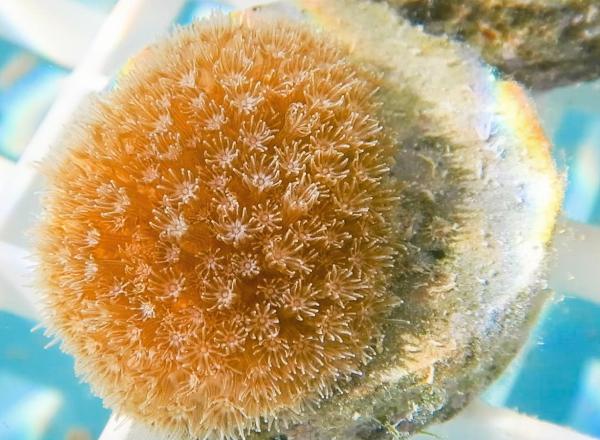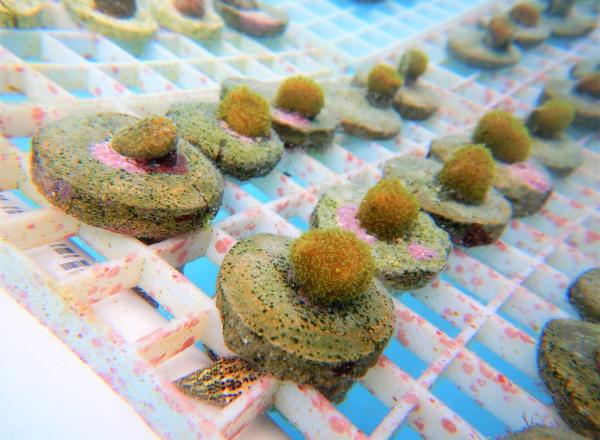Innovations
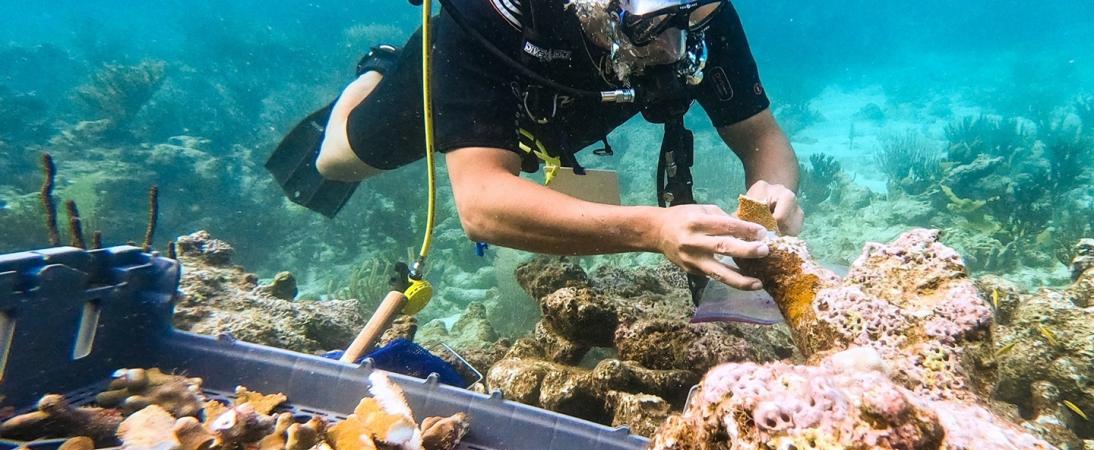
CORALVITA
Revitalizing the worlds' coral reefs, faster than ever
Coral Vita uses cutting-edge methods developed at marine institutes around the world – growing corals up to 50x faster than in nature while boosting their resilience against climate change – to restore reefs in the most effective way possible.
The problem
Covering less than 1 percent of the ocean’s floor, coral reefs sustain 25 percent of the ocean’s marine species, directly providing food, coastal protection, and livelihoods for more than 500 million people. The survival of these reefs and the people that depend upon them is in jeopardy: more than 50% have disappeared and scientists project that more than 90% will be gone by 2050. This problem has particularly affected the Caribbean and The Bahamas, where Coral Vita has established the world’s first commercial land-based coral farm for reef restoration.
The solution
Coral Vita seeks to provide local conservation solutions to address profound global environmental challenges, from climate change to destructive fishing. By rebuilding coral reef systems in an efficient and innovative way, Coral Vita can assist reefs in becoming more resilient to future threats. Land-based coral restoration grows coral up to 50x faster than traditional restoration methods, resulting in more diverse and resilient reef systems that can better sustain communities and biodiversity.
How it Works
Beginning with their pilot farm in Grand Bahama, Coral Vita is working to farm coral on land and introduce it to ocean ecosystems where the reef system has been devastated. Using their farms, Coral Vita can both grow coral and conduct research that will improve the resiliency of future reefs. Their 5-step process uses a broad ecosystem approach, from assessing reef health to monitoring newly installed coral growth.
Coral Vita uses microfragmenting to grow coral at up to 50x natural rates. This growth rate is one of the major advantages of land-based farming, which also provides better protection from storms and bleaching events and allows growers and researchers to control the coral’s environment. For example, water temperature can be modified to reflect future ocean conditions, stress hardening the coral and boosting their resilience once they are outplanted. Using a team of scientists, Coral Vita’s system is designed to facilitate research and development that will allow for future innovation. Not only is this process more effective and efficient, it also provides a space for residents and visitors to engage and conservation, better understanding how coral sustains our world and the ecosystems we all depend upon.
As they grow more diverse, resilient, and affordable coral, they’re also implementing a one-of-a-kind business model to scale impact. Most reef restoration projects are funded by disparate grants and donations that support localized efforts. Given coral reefs’ tremendous value and the risk posed by failing to protect them, Coral Vita is using a commercial approach to unlock critically-needed sustainable financing. First, they sell restoration as a service to customers that depend on coral reefs tourism, coastal protection, and fisheries benefits. As they develop these contracts, they leverage their land-based farms as interactive eco-tourism attractions, consistently generating additional revenue to support their restoration efforts. They also use the farms as education centers for local communities to build capacity and empower stakeholders who depend on reefs the most.
Goals
Coral Vita hopes to expand their farms and launch a global network of reef centers. While they currently operate out of Grand Bahama, more than 100 countries and territories around the world are in need of ecosystem-scale marine restoration. In addition to acting as a natural barrier against storms, coral restoration can provide massive socio-economic benefits through job creation and growth in biodiversity. This is just one reason that development banks are increasingly interested in nature restoration models.
Coral Vita sees coral reef restoration as a key component of future climate innovation as well as a potential ecotourism attraction, allowing visitors to coastal regions the opportunity to participate in restoration activities.
Challenges
One of the biggest barriers to establishing coral reef farms is often due to permitting. The sensitivity of reef systems means that coastal governments require lengthy, sometimes years-long processes to receive a permit. Coral Vita is working to build up the market for coral restoration which would streamline this process in the future and allow them to expand. Establishing this market will require investment, and Coral Vita is particularly hopeful to attract a diverse portfolio of smaller investments which would help them to bring coral restoration to a larger scale. Unlike mangroves and seagrass, which sequester large amounts of carbon and enable restoration projects to tap into global carbon credit markets, coral restoration must rely on other funding mechanisms to facilitate large-scale restoration projects.
Coral Vita’s restoration work has also been impacted by natural disasters and COVID-19. Their first year in Grand Bahama was spent engaged in humanitarian efforts to help the area recover from Hurricane Dorian. In 2020, Coral Vita launched an adopt-a-coral campaign to raise funds amidst the pandemic and subsequent economic downturn
Impacts to Date
Coral Vita’s flagship coral farm has already achieved substantial impact. Through microfragmenting and assisted evolution, they have grown coral at up to 50x natural rates from 24 native species and bred native species to be more resilient. In the wild, coral spawning typically produces one coral recruit from every one million eggs: through lab-based cultivation Coral Vita brought that ratio from 1,000,000:1 to closer to 100:1 for Diploria strigosa in 2019 and Acropora palmata in 2020. They signed a restoration as a service contract with the Government of The Bahamas, which has already been matched by the Grand Bahama Port Authority. Using the coral farm as a marine education center, they’ve educated over 1000 Bahamian students and fishermen and work to build capacity to empower a new generation of local ocean stewards.
This scientific success has been buoyed by a robust outreach program: their initial adopt-a-coral initiative generated $20,000 for the reef facility. They have successfully raised $2 million in start-up funds to transform their pilot farm into a state-of-the-art facility. Coral Vita has also laid the groundwork for a powerful marine conservation coalition: bringing together researchers, advocates, and local communities to preserve coastal environments. They have signed contracts with the Bahamian government to launch broader blue economy and disaster recovery initiatives through their pilot farm facility.
What's Next
Coral Vita hopes to continue improving and expanding their coral restoration model. As the market for conservation solutions expands, they plan to bring their innovation to coastal communities around the world. In the meantime, they are working on incorporating the tourism industry into their initiative, allowing their farm and future projects to act as educational centers and attractions for visitors.
From pension funds to development banks, the world is beginning to take note of the immense potential that nature-based solutions like coral restoration have to save the planet. Whether creating jobs, building living seawalls for coastal defense, or protecting future food security, in the words of Coral Vita Co-Founder and Chief Reef Officer Sam Teicher: “When it comes to coral reefs, the best thing to do is to stop killing them. But until our leaders in government, industry, and the media solve for climate change, overfishing, and habitat destruction, when it comes to rapidly scaling up and funding coral restoration it’s a no brainer.
